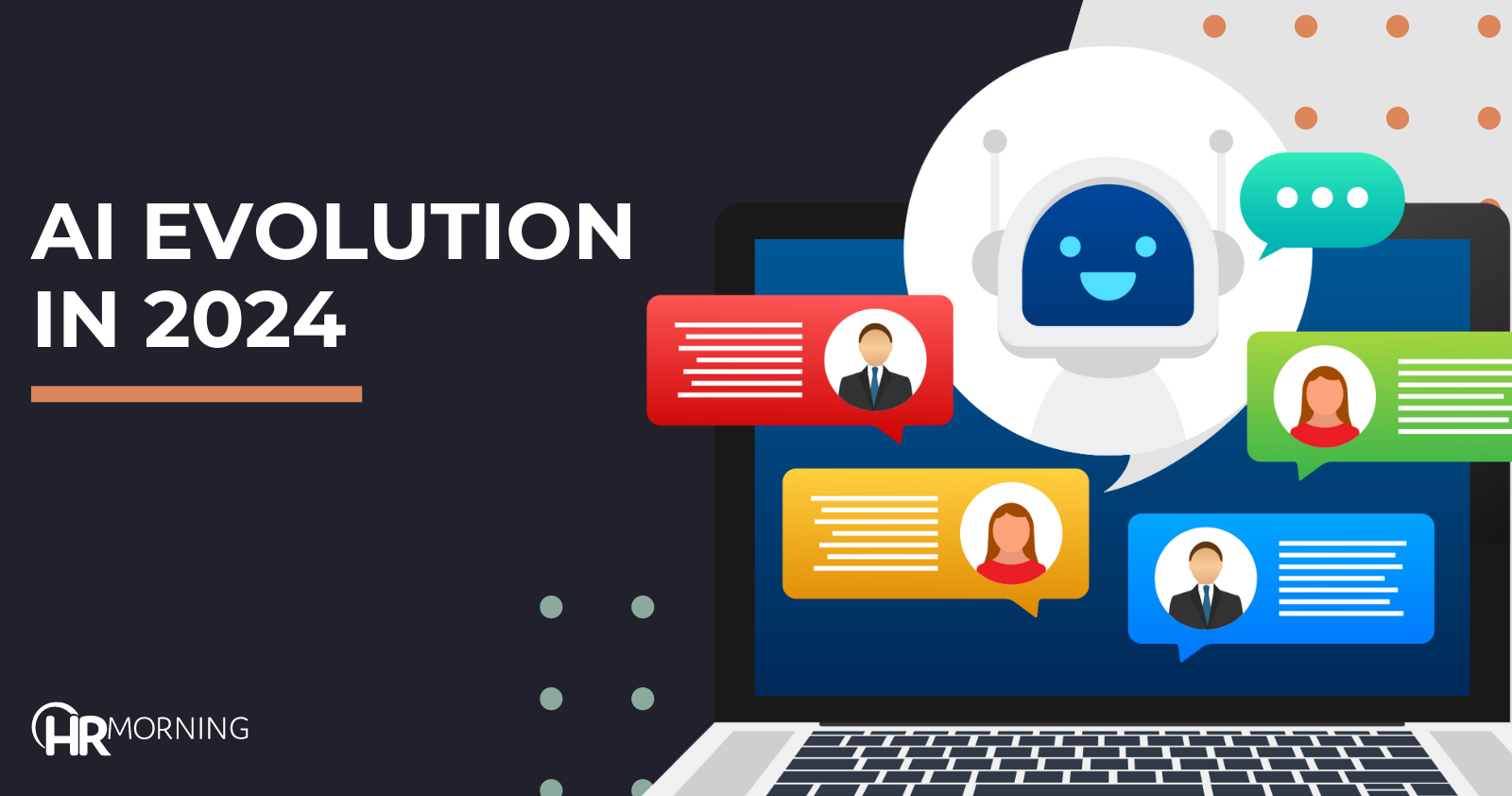For many, 2023 will be remembered as the year of the AI boom. In fact, Microsoft CEO Satya Nadella called 2023 “The Year of AI.” But what does that mean for AI in 2024?
For HR pros, AI has been a mixed bag: Some have fears that it will overtake their jobs, while others are excited at the reduction of time-sucking tasks to focus on the more human aspects of HR.
Whichever side of the coin you’re on, you’ll want to be prepared for whatever’s in store for AI in 2024. Here’s what to expect.
2023: The year of AI
While AI was introduced well before this year, its capabilities were greatly expanded – and became widely available – this year, giving many a solid idea of what it could really do.
From new AI-powered software to chatbots, AI has grown exponentially since the release of the first version of ChatGPT. Its rapid growth rate left many uneasy about the future of AI in 2024 and beyond since there was little time to create regulations and rules around its use.
For HR pros, this created a whole host of problems in the realm of AI, like avoiding biases in hiring and creating policies around AI’s use in the workplace. Its powerful capabilities also created concern about job security for many, especially in a year that was rampant with layoffs.
Despite this, many HR pros adopted AI in the past year. In fact, 55% of organizations have adopted AI, according to a recent McKinsey & Company survey, and the number of companies using AI in 2024 is expected to increase.
To inform your strategy for AI in 2024 and properly prepare for what’s ahead, here are three predictions about what HR can expect.
3 predictions for AI in 2024 (and one bonus!)
1. Shift to casual, daily use
With the introduction of ChatGPT – and its record-breaking growth – AI became available to virtually everyone. And, even with the fears about AI’s impact on job security, business leaders have realized that AI can be harnessed as a tool to support operations.
“AI will start to move from being a topic of conjecture at the C-suite level to having a broader acceptance in day-to-day HR operations,” says Geoff Webb, VP of solution strategy at isolved.
HR pros may regularly use AI in 2024 to help automate repetitive tasks and streamline HR operations. In fact, a recent survey found that more than half (61%) of HR pros are investing in AI to streamline processes.
The acceptance and adoption of day-to-day AI use shows that some sentiments about AI overtaking jobs have been quelled, and HR pros are ready to embrace all of the ways that AI can support them. “In 2024, we can expect unprecedented integration of artificial intelligence in the workforce,” says Ned Rhinelander, chief technology officer at meQuilibrium. “For most workers, AI will become a side-by-side co-worker.”
2. Focus on strategy
With an increase in day-to-day use, many leaders will be pushed to create a formal strategy and game plan for how AI will be used in the workplace. “There’s a real appetite among HR leaders to harness AI, but they will be looking for guidance on how and where to start as we move into 2024,” says Webb.
Consider that of the 28% of workers currently using generative AI at work, over half are doing so without formal approval, according to research from Salesforce. To make matters worse, just 4% of companies have a defined strategy for AI in HR, according to the Josh Bersin Company.
“This hesitant nature will creep into the new year. HR leaders want to leverage AI, but they will need a roadmap in 2024 to understand how to begin and best optimize their use of AI,” says Webb.
3. Advancements in regulations and legislation
AI’s rapid adoption has made it hard for legislation to keep up. Although strides have been made in the last year – including an Executive Order on AI safety and security and a New York City law regulating the use of AI in hiring – AI regulation is still in its early stages.
“HR should be cautious in reviewing and validating AI-based HR tech,” says Lucy Beaumont, solution lead for SHL. “AI is largely unregulated and there are risks in its use.” Regulations also vary by state, making the landscape even trickier to navigate for many companies.
With such a focus on AI – and its legal risks – HR pros should expect a surge of emerging legislation around AI regulation as government agencies try to catch up with the rapid growth of AI in 2024. “As organizations look to ride this wave, they will need to be savvy about understanding the technology available and validating its suitability as we integrate AI in 2024,” says Beaumont.
Bonus: Shift to behavior skills
The evolution of AI in 2024 will have far-reaching impacts, including influencing what qualities and skills HR pros need to hone in on for the new year.
“While AI will be playing a greater role in the workplace, there will also be a growing focus on unique human or soft skills that AI is incapable of replicating,” says Webb. “HR and the broader workforce will need to get comfortable honing their most “human” skills – to shape choices and direction, provide comprehensive context and be better leaders in the new year.”
In a broader context, AI will also impact what employers are looking for when they recruit new talent or upskill their workers. “The focus on technical skills has helped HR hire people who can hit the ground running and deliver quickly,” says Beaumont. “In 2024, we will see the pendulum swing to a focus on behavioral skills; identifying individuals who have the agility to learn new skills, who can problem solve and communicate their findings to others.”


